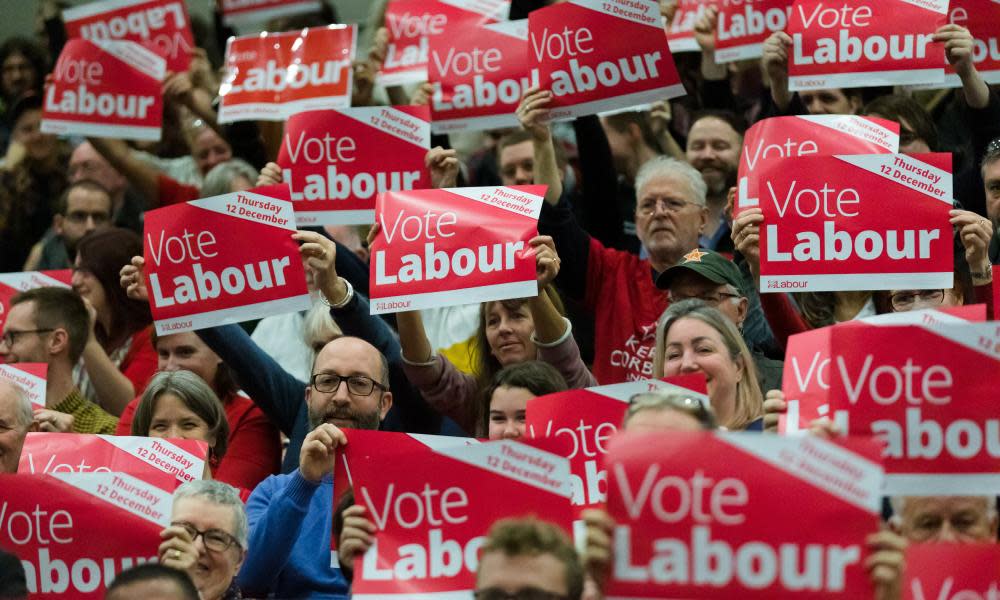Why I am campaigning for Labour in this seismic election

My earliest memory of canvassing for Labour was following my mum around a damp Falkirk tower block. It was the late 1980s, not long after the Tories won their last big parliamentary majority, and my twin sister and I excitedly shoved leaflets through letter boxes, our understanding of politics not much more advanced than Margaret Thatcher Is Very Bad Indeed. The tradition continued in the runup to the 1992 general election, this time on rainy Stockport streets. When John Major’s Tories triumphed, my teachers turned up to primary school the next day wearing black.
My parents met while canvassing for the Labour party – the romance! – in a snowstorm outside Tooting Bec station in the winter of 1969. They were on the losing side of the Labour civil wars of the 1980s as the party lurched to the right, but their perspective was one I inherited: the “worst” Labour government was always better than the “best” Tory one; that so long as Labour and the trade unions were institutionally wedded, the party had an organic link to working-class people that made it worth supporting; that you should stand and fight within the party for what you believed in, however hopeless it seemed; and that the responsibility of a socialist was to be involved in mass movements and struggles, not to stand aside.
The Tories have advantages: the financial support of tycoons, and the active and partisan support of most of the press
To the dismay (sometimes fury) of many on the left, this philosophy led me to campaign for Labour under Tony Blair and Gordon Brown, and to travel the country organising mass canvasses for Ed Miliband’s Labour in 2015.
This is a far more seismic election than any of those – a fork in the road for Britain that can be compared only to Thatcher’s assumption of power in 1979. On the one hand is a party committed to a hard Brexit as a blunt instrument to introduce Thatcherism on speed, led by a shameless liar who seizes any chance to bait Muslims, with a cabinet containing more ministers who voted against LGBTQ rights than it does LGBTQ people (zero). On the other is a party offering an escape from a tortuous Brexit, a redistribution of wealth and power, and an end to the failed era of market fundamentalism and ruinous austerity.
The political differences I have with Jeremy Corbyn might be smaller than with those of his predecessors, but they still exist. The lack of a consistent pro-migrant case after the referendum was cowardly. The shift away from “constructive ambiguity” on Brexit was too slow. The leadership should have been swifter and more decisive in dealing with antisemitism on the left’s fringes. There has been a lack of courage in challenging the failed war on drugs and our punitive justice system. But just look at the stakes. Look at the abyss this country hurtles towards.
Related: Microtargeting, bots and hacking: will digital meddling really swing this election? | Alex Hern
In this election, the Tories have certain key advantages. They have the financial support of tycoons and hedge fund managers and, more importantly, the active and partisan support of most of the British press. Labour’s principal counterweights are a huge grassroots army and the organising power of social media. So for the next five weeks, I will be travelling the country to encourage Labour members and supporters to knock on doors in key constituencies, and using Facebook and Twitter to spread the word.
Many of the canvassers I’ve met are young and have never knocked on doors for a political party before: for some, interest in politics is altogether new. They don’t agree on everything with each other, let alone with Labour. They are aware that this is the fight of their lives – and they don’t want to regret failing to act in the face of looming catastrophe.
For some, this raises a question about the demarcation between journalism and activism. As a columnist – rather than, say, a news reporter – my job is to express my opinions. In this regard, all columnists are activists to the extent that they use their platform to persuade others of their political views.
The tradition of the politically engaged journalist is a long one, of course. The legendary leftwing muckraker Paul Foot – after whom our most prestigious investigative journalism award is named – stood for office several times as a socialist candidate. George Orwell didn’t merely campaign for a political party: he took up arms for one, in the Spanish civil war.
Meanwhile, the pages of the Telegraph – Johnson’s former employer – as well as the Sun, the Daily Mail, the Express and the Times, are increasingly filled with propaganda straight from the Tory party distributed to millions of households on a daily basis. (Have a look at last weekend’s Sunday Telegraph, Mail on Sunday and Sunday Times – all leading with the same fake Labour spending figures cooked up by the Conservative research department.) The left’s activists write a few opinion columns; the right’s activists write the front pages.
In just over a month, voters will determine the shape of Britain for a generation. We could stumble further down the path of authoritarian rightwing populism. Or we could have a chance to cure the defining injustices of our time – the cuts to public services, social security and living standards that have precipitated the present crisis. The Labour party, and its leaders, are not without faults. But they are incomparable with the evils of the governing party. And yet the odds are stacked in favour of the Tories, whose historic mission is to defend the powerful vested interests that have brought us to this point.
For anyone with the ability to fight back, there is only one question: if not now, then when?

 Yahoo News
Yahoo News 
